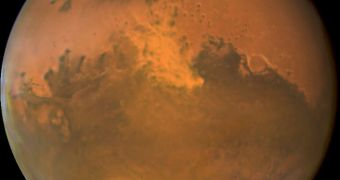The American space agency currently envisions setting up a permanent presence on Mars by as early as 2028. This goal will be made difficult by a large number of things, including among others the obstacles facing crews in getting there, long-term confinement, space radiation, Martian weather, the lack of plentiful supplies and so on. But, on the very surface of the Red Planet, space storms will undoubtedly be the largest threat.
These events would bombard prospective Mars settlements or bases with impressive amounts of radiation. More high-energy photons pass through the planet's atmosphere than they do on Earth, as our neighbor has a weaker magnetic field, and cannot fight off dangerous outbursts of radiation. For this very reason, colonists would need to live inside facilities featuring 30-foot-thick walls made of local sand that would be able to stop the harmful effects of the radiation.
The space storms also last for a very long time. They occur once every 11 years, in tune with the solar cycle, and they last for about 3 years, before finally calming down. Under these circumstances, prospects of survival for human settlers are dim, except if an early warning system against the invisible photons can be devised. Such alerts would serve to prompt people to take shelter inside safe houses, and would also inform then when it's alright to go back out, explains Rochester Institute of Technology (RIT) Chester F. Carlson Center for Imaging Science professor Roger Dube.
The expert is the recipient of a NASA award aimed at developing such a radiation monitoring systems for future applications on other planets. “The technology we're building uses existing satellites and solar telescopes that are in orbit or in space. Our innovation will be to add artificial intelligence to the recognition of space storms. Initially the technology will be used to calculate the probability of the Earth being hit by a space weather storm, and once we've got that we'll determine the orbital calculations for Mars. Mars does not enjoy the defenses against such storms that Earth has,” Dube says.

 14 DAY TRIAL //
14 DAY TRIAL //